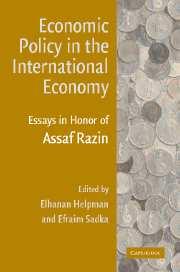Book contents
- Frontmatter
- Contents
- List of Contributors
- Preface
- Introduction
- PART ONE FINANCIAL ISSUES IN OPEN ECONOMIES: THEORY
- PART TWO FINANCIAL ISSUES IN OPEN ECONOMIES: EMPIRICS
- PART THREE ECONOMIC GROWTH: THEORY AND EMPIRICS
- PART FOUR PUBLIC ECONOMICS
- 11 Simulating Fundamental Tax Reform in the United States
- 12 The International Macroeconomics of Taxation and the Case against European Tax Harmonization
- 13 Home Bias in Portfolios and Taxation of Asset Income
- 14 Social Dumping in the Transformation Process?
- PART FIVE POLITICAL ECONOMY
- Author Index
- Subject Index
14 - Social Dumping in the Transformation Process?
Published online by Cambridge University Press: 03 November 2009
- Frontmatter
- Contents
- List of Contributors
- Preface
- Introduction
- PART ONE FINANCIAL ISSUES IN OPEN ECONOMIES: THEORY
- PART TWO FINANCIAL ISSUES IN OPEN ECONOMIES: EMPIRICS
- PART THREE ECONOMIC GROWTH: THEORY AND EMPIRICS
- PART FOUR PUBLIC ECONOMICS
- 11 Simulating Fundamental Tax Reform in the United States
- 12 The International Macroeconomics of Taxation and the Case against European Tax Harmonization
- 13 Home Bias in Portfolios and Taxation of Asset Income
- 14 Social Dumping in the Transformation Process?
- PART FIVE POLITICAL ECONOMY
- Author Index
- Subject Index
Summary
Business representatives and union leaders in highly industrialized countries often accuse the governments of less developed countries of practicing social dumping in the sense of maintaining an underdeveloped welfare state to create a competitive cost advantage for their own industries. In particular they argue that the less developed countries deliberately neglect the legislation for good social standards in terms of social fringe benefits, protection against injuries, pension schemes, codetermination rights, and the like. To stop the seemingly unfair competition resulting from social dumping they postulate an international harmonization of social conditions, and sometimes they even advocate retaliatory trade restrictions to enforce the harmonization.
International agreements like those of the International Labor Organisation (ILO) or the EU Social Charter reflect this influence in that they define a number of social minimum standards that are binding for the signing parties. The EU Social Charter prescribes a weekly maximum working time, minimum recreation periods, minimum safety standards for new and old machinery, rules for the employment of minors, equal treatment of gender, minimum times for maternity leaves, dismissal protection rules for pregnant women, and many additional workers' rights. Similarly, the ILO members have agreed to establish a system of labor standards regarding minimum wages, maximum working hours per week, minimum rest time per week, a guaranteed number of holidays with pay, and the prohibition of the worst forms of child labor.
- Type
- Chapter
- Information
- Economic Policy in the International EconomyEssays in Honor of Assaf Razin, pp. 405 - 428Publisher: Cambridge University PressPrint publication year: 2003



